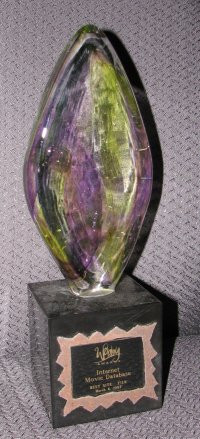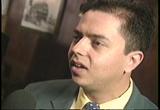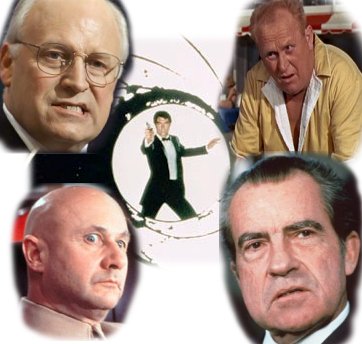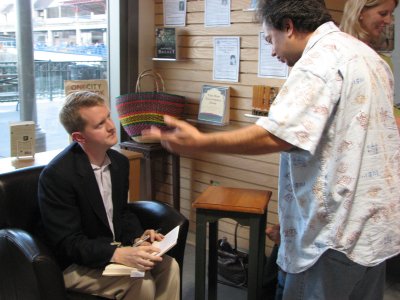[Reproduced and edited from e-mail.]
In our last episode, I co-founded the Internet Movie Database. The IMDb team consisted of 15 or 20 film geeks scattered around the globe. We were a “virtual company,” coordinating all our activity via e-mail and the rare conference call. Of all the team members, I was the only one in Northern California and thus became the IMDb’s representative at the first Webby Awards ceremony in 1997.
Andrea and I prepared by shopping for new clothes; the invitation instructed us to “dress swanky.” I wrote and rehearsed an acceptance speech just in case the IMDb beat the other four sites nominated in the Film category.
The dot-com boom had not yet really begun in earnest, and so I was surprised to see that many large corporate sponsors were behind the awards ceremony; several “celebrity judges” had voted on the winners; San Francisco Mayor Willie Brown was the official “welcomer”; and it was slated to be telecast on KRON, PBS, and The Discovery Channel. For a bunch of computer geeks it was an unaccustomed level of attention and glamour, but not unwelcome. With this event, the revenge of the nerds had officially begun.
When I saw all the trendy corporate sponsors with their brands emblazoned here and there at the club, I despaired of our chances of winning. I was sure that the fix was in, and only the moneyed sites would be walking away with the awards. The IMDb was strictly an enthusiast site, not part of a big media conglomerate.
We arrived at Bimbo’s 365 Club a little after 8pm. Being nominees, we were allowed to bypass the long queue of people waiting to get in. We saw a line of limousines dropping off dignitaries. Big searchlights shone upwards to mark the location of the event.
Inside, we received our “nominee” badges and drink tokens. We milled about along with a large number of trendy Multimedia Gulch folks. I’d been to Bimbo’s a few times before, but this was the first time I’d seen all the rooms of the club open and in use.
In the main room, a swing band was playing dance tunes. Andrea and I found a table and had a couple of drinks. I took a last look at my speech, which by now I had comfortably memorized.
The event began. Mayor Brown came out to say a few words about how he loved The Web magazine (which had organized the show), how proud he was that San Francisco was hosting this event, the first of its kind, and so on. He told a couple of good jokes, too, which I promptly forgot. Mayor Brown was something of a national celebrity, and in person it was easy to understand his legendary charm.
The mistress of ceremonies, columnist and playwright Cintra Wilson, then came out, made a few very funny remarks, and got the show under way. Her first rule was that, to keep things moving along, winners would be limited to an acceptance speech of no longer than five words! I tore up my speech — oh well!
There followed a rapid-fire sequence of category and nominee announcements, followed by winners and very quick acceptances. Film was the third category and the IMDb won! I ran up on stage and got a kiss and a trophy. Then I thanked our many thousands of contributors over the past seven years (in almost as many words) and ran off. It was very exciting. As I left the stage, some guy pulled me aside and told me to join the “winners’ circle” in the lounge after the ceremony.
 The trophy itself was ugly as sin and tremendously heavy — cubical black base made of solid neutronium, near as I could tell, with a badly-etched plaque stuck on it and supporting a freakish oblong colored glass ovoid, which actually looked kind of cool at one point when I set it down on a table and some light came from behind it. The fifteen winners hefted their trophies around the club like Sisyphus. Some who weren’t careful enough with theirs found that the glass ovoid snapped easily off of the base.
The trophy itself was ugly as sin and tremendously heavy — cubical black base made of solid neutronium, near as I could tell, with a badly-etched plaque stuck on it and supporting a freakish oblong colored glass ovoid, which actually looked kind of cool at one point when I set it down on a table and some light came from behind it. The fifteen winners hefted their trophies around the club like Sisyphus. Some who weren’t careful enough with theirs found that the glass ovoid snapped easily off of the base.
Most of what followed was a blur because I was so thrilled at having won. I do remember the presentation for the best Sex site, though. One of the guys from Bianca’s Smut Shack who came up on stage to accept their award was wearing a Hugh Hefner style robe, smoking a pipe. Big laughs.
After the ceremony, we milled about some more and made our way to the lounge, where several camera crews were at work. Production people from various TV shows asked me to stick around so I could be interviewed. While waiting, Andrea and I met Mayor Brown. He was talking to a woman who had also won a Webby. He asked her in what category she’d won. “Politics,” she said. Mayor Brown turned to me and said, in mock confidentiality, “I want to see the people who won for their sex site!” I thought, “He’d get my vote, if I lived in San Francisco.”
Then I met an interviewer from a Web-related program on PBS. I underwent a very short interview in which I waxed enthusiastic about having won, espoused the IMDb philosophy (i.e., by film fans, for film fans), described the site, and said a few words about the team. I managed to work in much of what had been in my acceptance speech.
After that, there were two more interviews that were almost identical in content. One was for The Discovery Channel’s web show. The other was for C|net. The Discovery folks told me that my footage would be edited into a segment they’d already done about how the IMDb blows away the corporate movie sites. Some PC magazine reporters spoke to me too.
Andrea and I stuck around for a little while longer as the interviewing wound down and music, dancing, and drinking picked up again. Then we left, drove across town, and had a bite to eat at Mel’s Drive-In — suitable, I thought, since it was the setting for a movie (namely, American Graffiti).
It was great fun. Andrea and I resolved to embark on a career of ingratiating ourselves with politicians, celebrities, and captains of industry in order to get invited to events like this all the time. And in fact we did show up for the 1998 and 1999 Webbies…
(…to be continued…)
 Now they’re back again in
Now they’re back again in  The trophy itself was ugly as sin and tremendously heavy — cubical black base made of solid neutronium, near as I could tell, with a badly-etched plaque stuck on it and supporting a freakish oblong colored glass ovoid, which actually looked kind of cool at one point when I set it down on a table and some light came from behind it. The fifteen winners hefted their trophies around the club like Sisyphus. Some who weren’t careful enough with theirs found that the glass ovoid snapped easily off of the base.
The trophy itself was ugly as sin and tremendously heavy — cubical black base made of solid neutronium, near as I could tell, with a badly-etched plaque stuck on it and supporting a freakish oblong colored glass ovoid, which actually looked kind of cool at one point when I set it down on a table and some light came from behind it. The fifteen winners hefted their trophies around the club like Sisyphus. Some who weren’t careful enough with theirs found that the glass ovoid snapped easily off of the base.

